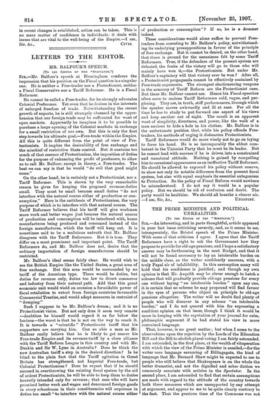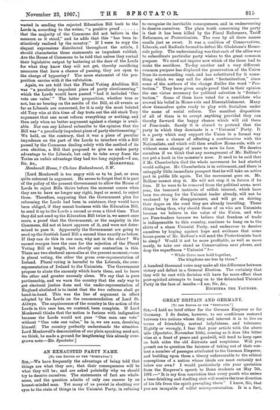THE PRIME MINISTER AND POLITICAL UNREALITIES.
[To THE EDITOR OF THE " SPECTATOR."
SrE,—An interesting, and in parts thoughtful, article appeared in your last issue criticising severely, and, as it seems to me, intemperately, the Bristol speech of the Prime Minister. With some of that criticism I agree. I agree that the Tariff Reformers have a right to ask the Government how they propose to provide for old-age pensions, and I hope a satisfactory answer may be forthcoming in the next Budget, and that it will not be found necessary to lay an intolerable burden on the middle class, as the writer confidently assumes, with a truly Papal air of infallibility. In this assumption many will hold that his confidence is justified; and though my own opinion is that Mr. Asquith may be clever enough to hatch a scheme that will gradually provide old-age pensions for every one without laying " an intolerable burden " upon any one, it is certain that no scheme he may propound will find favour in the eyes of persons who object on principle to old-age pensions altogether. The writer will no doubt find plenty of people, who will discover in any scheme "an intolerable burden," and I do not quarrel with him for expressing a confident opinion on that issue, though I think it would be more in keeping with the reputation of your journal for calm, philosophic argument if he had stated his view in more restrained language.
That, however, is no great matter; but when I come to the observations upon the rejection by the Lords of the Education Bill and the Bill to abolish plural voting I am fairly astounded. I am astounded, in the first place, at the wealth of vituperation with which the view of the Prime Minister is assailed,—for the writer uses language savouring of Billingsgate, the kind of language that Mr. Bernard Shaw might be expected to use to people who still believe that Shakespeare is on the whole the better dramatist, and not the dignified and sober diction we commonly associate with articles in the Spectator. In the second place, I am astounded to find that certain assumptions are made with regard to the attitude of the country towards both these measures which are unsupported by any attempt at argument, and appear to me tb be quite clearly contrary 'to the fact. That the precious time of the Commons was not
wasted in sending the rejected Education Bill back to the Lords is, according to the writer, " a positive proof that the majority of the Commons did not believe in the measure as it stood," and he adds that this " has been in- stinctively realised by the country." If I were to copy the elegant expressions distributed throughout the article, I should characterise these statements as impudent rubbish. Axe •the House of Commons to be told that unless they curtail their legislative output by battering at the door of the Lords for what they know they will not get, thereby sacrificing measures that have a chance of passing, they are open to the charge of hypocrisy ? The mere statement of the pro- position carries with it the refutation.
Again, we are told that the Plural Voting Abolition Bill was "a peculiarly impudent piece of party electioneering" which the Lords would have passed "had it included ' One vote one value.' " The latter proposition, whether true or not, has no bearing on the merits of the Bill, at all events as far as Liberals are concerned, for it is only the most belated old Tory who at this time of day trots out the old stock Tory argument that one must reform everything or nothing, and then only when no better argument against a change is avail- able. Nor can any Liberal subscribe to the opinion that the Bill was " a peculiarly impudent piece of party electioneering." We hold, on the contrary, that it was a piece of peculiar impudence on the part of the Lords to interfere with a Bill passed by the Commons dealing solely with the method of its own election, a Bill that proposed to give no undue party advantage to the Liberals, but only to take away from the Tories an unfair advantage they had too long enjoyed.—I am,
[Lord Monkswell is too angry with us tq be just, or even quite coherent in argument. He seems to forget that it is part of the policy of the present Government to allow the House of Lords to reject Bills thrice before the moment comes when they are to have no longer any right, legal or moral, to reject them. Therefore, supposing that the Government plan for reforming the Lords had been in existence, they would have been obliged, if they meant business with the Education Bill, to send it up to the Lords a second or even a third time. That they did not send up the Education Bill twice is, we assert once more, a proof that the Government, or the majority in the Commons, did not at heart approve of it, and were not deter- mined to pass it. Apparently the Government are going to send up the Scottish Land Bill a second time exactly as before. If they can do this in one case, why not in the other ? We cannot reargue here the case for the rejection of the Plural Voting Bill at length, but shortly our contention is this. There are two electoral anomalies at the present moment,—one is plural voting, the other the gross over-representation of Ireland. Plural voting is harmful to the Liberals, the over- representation of Ireland to the Unionists. The Government propose to abate the anomaly which hurts them, and to leave the other and greater anomaly alone. We say that is pure partisanship, and we warn the country that the only way to get electoral justice done and the under-representation of England abolished is to insist that the two reforms shall go hand-in-hand. This was the line of argument in effect adopted by the Lords on the recommendation of Lord St. Aldwyn. The acquiescence of the country in the action of the Lords in this case has, we contend, been complete. If Lord Monkswell thinks that the nation is furious with indignation because the Lords would not pass " One man one vote " without " One vote one value," he is, we are sure, deceiving himself. The country perfectly understands the situation. Lord Monkswell's denunciation of our plain speaking need not, we think, be made a ground for lengthening this already over- grown note.—ED. Spectator.]



















































 Previous page
Previous page